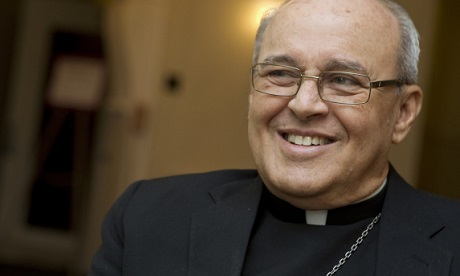Many adjectives describe Cardinal Jaime Ortega, who died last week: father, brother, cardinal of Cuban youth, voice of Cuba’s poor, Cuban bridge to the US, accomplished pianist.
He “was an important, and at the same time, controversial man of the church, who played a critical role in gaining ‘more spaces’ so that the Catholic Church in Cuba could exercise her mission of evangelisation within a Marxist nation,” says one of Ortega’s frequent visitors, Archbishop Thomas Wenski of Miami.
“He was key to receiving the visit of three popes and negotiating the freedom of political prisoners. May he rest in peace.”
Ortega (82), who was Havana’s retired archbishop, died on 26 July.
Many visitors, including various US bishops, visited and prayed by his bedside during his last days.
Wenski, who was among them, says Ortega was “a dedicated man of the church and an exemplary Cuban”.
After Fidel Castro’s communist revolution in 1959, he was jailed for eight months as a suspected opponent of the regime.
He was a leading spokesman for Cuban Catholics on national and international issues during his 35 years as archbishop.
Like popes St John Paul II, Benedict XVI and Francis, Ortega took the view that the US economic blockade was keeping thousands of people poor while doing little to pressure the Cuban government to expand freedoms and human rights.
As archbishop, he hand-delivered private messages from Pope Francis to then US president Barack Obama and Fidel Castro’s brother and successor, Raul Castro, urging them to put aside Cold War-era mistrust and forge a new relationship between the United States and Cuba.
He also used every opportunity possible to plead with the US government to end the blockade. Eventually political tensions thawed and more contact between Cuba and the US recommenced.
Ortega also negotiated with the government for church buildings to be restored and reopened, and this year saw a new Catholic church opened – the first to be built since 1959.
Not everyone appreciated Ortega however.
Some Cubans in exile say he didn’t do enough to denounce the island’s government.
Some even singled out the date of his death – on the anniversary of an important rebellion that led to the overthrow of Cuba’s former government – as proof that he was favourable to the government.
However, Puerto Rico’s Archbishop Roberto Gonzalez Nieves says although Ortega was “misunderstood” by Cubans in exile, “he was much loved by the faithful Catholics in Cuba.”
Source
Additional readingNews category: World.




